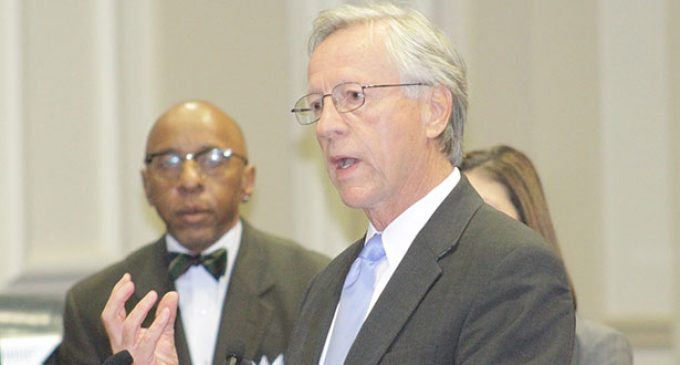Mayor’s ‘Poverty Thought Force’ seeking public ideas

Above: Mayor Allen Joines
Mayor Allen Joines’ Winston-Salem Poverty Thought Force is looking to the public for ideas to reduce poverty in Forsyth County.
The Thought Force is a 21-member panel that will take community ideas for reducing poverty and turn them into actionable proposals. The panel is comprised of many government officials and heads of local organizations that deal with poverty. Representatives of local colleges such as Wake Forest University Provost Rogan Kersh, who chairs the group, and Winston-Salem State University Chancellor Elwood Robinson are also on the panel, and will be using their resources to analyze ideas and see which can be effectively implemented.
“I tried to come up with a sort of diverse group of individuals who were good thinkers, who represent various segments of the community and who had interest in poverty reduction,” said Joines.
The Thought Force is divided into five sub-committees dealing with different aspects of poverty: Health and Wellness; Housing and Homelessness; Job and Workforce Development; Education and Life Skills; and Hunger and Food Insecurity. Each subcommittee is holding a meeting to get ideas from the public. The meetings follow the “World Café” model, in which attendees are divided into rotating groups that discuss specific prompts, as guided by a moderator, before sharing findings with the larger group at the end. The first such event held in September, focusing on food insecurity, yielded about 300 ideas that the Thought Force is still reviewing. The rest of the meetings will be held in January and February.
“What’s been done before hasn’t worked” said Joines. “The idea is to generate a lot of ideas and test each one of those ideas with impactfulness and doability and then have some really good critical thinking individuals kind of look at it and come up with what makes sense.”
Joines said that he plans to add at least one business leader to the panel. He said he hopes those who have lived in poverty will share their insights during World Café meetings.
Joines said the goal is to come up with 20-25 final recommendations on reducing poverty next year that‘ll be presented to the public for further comment before being submitted to the city, county, United Way and other agencies and organizations for adoption. He’s hoping to get broad community support for the plan that the Thought Force produces.
Bishop Todd Fulton, president of the Ministers’ Conference of Winston-Salem and Vicinity, is among the panel members. He said the more than 50 churches that make up the Ministers’ Conference see poverty in their congregations every week.
“Poverty has always been an issue in the African-American community,” he said.
Marlon Hunter, director of the Forsyth County Public Health Department, is also on the Thought Force. He said his department serves many low-income residents, and he’s hoping the panel will get at the root causes of poverty.
“Poverty is a social determinate of health,” he said.
Andrea Kurtz, director of the 10 Year Plan to End Chronic Homelessness and United Way Housing Strategies director isn’t on the panel (though Forsyth United Way President Cindy Gordineer is). She said the 10 Year Plan shows that such community collaborations can work.
Chronic homelessness, which is a disabled person who’s been homeless for a year or more or who’s been homeless four times in the past three years, is half of what it was in 2010. The plan has also ended veterans’ homelessness, meaning that a veteran in the homeless service system can receive housing in a matter of weeks.
Kurtz said that in order for the efforts on poverty to be successful, it’ll require the city, county and organizations involved to make serious commitments like what happened with the 10 Year Plan.
Winston-Salem Poverty Thought Force members
• Rogan Kersh, Wake Forest University provost
• Wynne Brown, Student Health Services director at the Winston-Salem State University Wellness Center
• Joe Crocker, Poor and Needy Division director at Kate B. Reynolds Charitable Trust;
• Beverly Emory, Winston-Salem/Forsyth County Schools superintendent
• Bishop Todd Fulton, Ministers Conference of Winston-Salem and Vicinity president
• Robert Garcia, Hispanic League vice president
• Lee Garrity, Winston-Salem city manager
• Art Gibel, Goodwill Industries of Northwest North Carolina president
• Cindy Gordineer, United Way of Forsyth County president
• Gary Gunderson, Faith and Health Ministries vice president at Wake Forest Baptist Medical Center
• Marlon Hunter, Forsyth County Public Health director
• Sen. Paul Lowe Jr. of N.C. Senate District 32
• Walter Marshall, Forsyth County commissioner
• Derwin Montgomery, Winston-Salem Council Member and Bethesda Center for the Homeless director
• Earline Parmon, outreach director for U.S. Rep. Alma Adams
• Kenneth Peacock, retired chancellor of Appalachian State University
• Evan Raleigh, city Community and Business Development deputy director
• Elwood Robinson, WSSU chancellor
• Michael Suggs, Goler Community Development Corp. president
• Larry Woods, Housing Authority of Winston-Salem CEO
• Linda Jackson-Barnes, director of the mayor’s office











